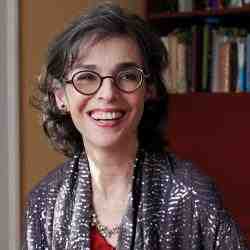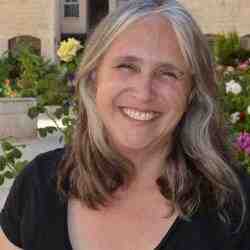Einführung
Bai Rohaniza Sumndad-Usman is committed to making peacebuilding a priority in the formative years of children by creating a wide-scale interfaith, intercultural, and intergenerational movement. She is working towards a culture of peace by establishing a holistic community-led peace education program that goes beyond the classroom and seeks to integrate peacebuilding as a way of life.
Die neue Idee
With her own experience as a child living in war, Bai Rohaniza concluded that to effectively build towards peace, the focus must shift to the underlying factors of conflict, such as discrimination, prejudice, and indifference. Through the Teach Peace Build Peace Movement (TPBPM), Bai Rohaniza aims to normalize a culture of peace for children. She does this through the mobilization of a core youth-led volunteer team that facilitates peace-related value formation programs throughout the country, and the creation of peace education materials that are replicated and shared with schools.
Bai Rohaniza formulated the principle of a PEACE HERO, a prototype of what every Peacebuilder should be - a charismatic, visionary leader who has acquired Peacebuilding values and skills and has accepted a mission and obligation of Peacebuilding as a way of life. She believes that in order to create sustainable peaceful societies, every child should be transformed into a PEACE HERO, who would then undertake a self-motivated responsibility to transform other people to become PEACE HEROES through action and example.
Bai Rohaniza’s approach is founded on her resolve to expand the concept of peace education by taking it out of the classroom and integrating it into the child’s lifestyle. TPBPM’s programs actively engage critical aspects of a child’s support system, acknowledging the home and extracurricular spaces as vital opportunities for learning. TPBPM is the only initiative in the Philippines running peace education programs for elementary-aged children. While other organizations and government programs target high school or college-aged youth, Bai Rohaniza believes that normalizing peace in the Philippines entails initiating peace education when a child is starting to form their frame of mind. Finally, TPBP is engaging schools and communities in both conflict and non-conflict zones, advancing the understanding that working towards a culture of peace lies in the hands of all Filipinos, not just those who are living in war.
Bai Rohaniza envisions a country where peacebuilding is not intimidating, but rather is relatable, engaging, and rooted in collective action. She is working towards a culture in which peace is not just the absence of conflict, but a way of life.
Das Problem
In the 2017 United Nations Report of the Secretary-General on children and armed conflict in the Philippines, it was stated that armed groups are actively recruiting and using children in open battle. The report cites a majority of children being used as human shields. Due to access limitations and security constraints, monitoring and verification of children in war have been difficult. To date, there has been no confirmed number of active child combatants in the Philippines. Statistically, youth recruitment into armed groups is rapidly increasing, with more and more young people being shaped to embrace violence. Reasons for this include poverty and lack of opportunities, prejudice against other religions and cultures due to experiences of discrimination and seclusion, misinterpretation of religious doctrines, and the indoctrination of violent ideology.
Traditional peace education in the Philippines has failed to address these underlying factors that compel young people to seek out these violent outlets, making them more susceptible to armed recruitment. In the Philippines, peace education initiatives implemented by the government seek to integrate it into traditional school curricula. This formal education approach bounds peace education within classroom walls; children then begin understanding the concept of peace as a subject they have to study, rather than live it as a part of their everyday lives. Formal peace education has also been unable to comprehensively engage students from different cultures and religions. In the Philippines, majority of the peacebuilding groups supporting education initiatives have a clear religious affiliation, making it difficult to implement truly inclusive programs. Furthermore, formal peace education programs focus solely on current conflict-stricken areas, enforcing the harmful notion that cultivating peace is a concern only for those living in armed conflict, when it should also be priority even for communities who have not experienced war.
Peace initiatives have always taken a “policy-first” approach, in which the implementing organization enters a community with a peace program already in hand, neglecting the input of local leaders and community members. Such an approach is especially harmful because it ignores the cultural systems within Muslim and Indigenous communities. Ultimately, this puts in place ineffective programs that are not sustained by the communities once the implementing organization leaves.
Formal peace education programs limit their engagement and impact assessment to schools, looking solely at the progress of students and teachers. This continues to reinforce the idea that peace is a subject to be studied in school, rather an in vital aspect of a child’s lifestyle.
Die Strategie
Bai Rohaniza recognized that countering this worsening impact of violence meant going beyond the path of formal education. Her approach seeks to challenge the notion that peace is simply the absence of conflict and reframes it as a way of interpreting our everyday lives. The Teach Peace Build Peace Movement is pioneering the paradigm shift in how peace education is envisioned in the Philippines.
Teach Peace Build Peace focuses on sustainably improving the subjective conditions and experiences through which children begin to form their beliefs, attitudes, and, practices. Bai Rohaniza believes that subjective conditions such as prejudice and discrimination are the foundation of conflict and ultimately normalize violent views within children. The organization’s programs focus on the age bracket of 9-13 years old, which is a critical psychological stage for children. It is the age range in which children learn to think for themselves. In the Philippines, it is also the age range that most children are recruited into violent groups. TPBPM is working towards the institutionalization of a proactive peace education curriculum within schools and communities.
The Teach Peace Build Peace Schools and Communities of Peace Heroes Formation (SCPHF) Program is a pilot program designed as a holistic approach to peace education, conflict prevention, and proactive citizen-led peace building. TPBPM defines the Culture of Peace as the Peaceful Way of Life, composed of three dynamic dimensions namely: 1. Formational Dimension, 2. Relationship building Dimension, and 3. Systemic dimension.
The initial phase of the program entails workshops and formation sessions for students, educators, parents, school leaders, and community members on understanding a culture of peace. In this Formational Dimension, the movement focuses on sustainably improving the subjective conditions and experiences through which children begin to form their beliefs, attitudes, and, practices. TBPBM establishes the curriculum and creates the associated materials and activities that are integrated within art creation, sportsmanship, and gameplay. The curriculum components highlight interfaith and intercultural stories as well as proactive peacebuilding. TPBPM supports the schools and communities throughout the initial phase, but ultimately empowers them to sustain this program independently in the long-run.
TPBPM has piloted the program in two schools in Mamasapano, and Maguindanao; one school in Maharlika, Taguig; and a school in an Aeta community in Porac, Pampanga. Bai Rohaniza wanted to ensure that the program was being implemented in both conflict and non-conflict areas, building towards the normalization of peace beyond the reactionary afterthought of war. TPBPM is currently working to pilot the program in four more schools, with the specific focus on areas where the recruitment of children into armed conflict are at its highest. In addition to this, TPBPM is an active partner for Department of Education programs. Most recently, Bai Rohaniza has been working on a Peace Education Toolkit. She realized that a majority of value-formation materials and literature in the Philippines are far too Westernized and not applicable to the context of local children. Thus, she and the TPBPM team have been gearing up to launch educational resources relevant to Filipino children. She aims to have the toolkits made available to classrooms and communities all over the Philippines.
Due to the recent outbreak of war in Marawi, TPBPM’s efforts have been focused on providing psychosocial peace building support to displaced children in affected areas where psychosocial care and peace education are integrated in their sessions.
Die Person
Bai Rohaniza was born into an inter-faith family. Her father is a Maranao Muslim, while her mother is a Christian who converted to Islam. She was able to learn about both religions and celebrate the diverse traditions of both her identities. When she was two years old, her family relocated to Riyadh, Saudi Arabia. Bai Rohaniza was seven years old during the outbreak of the Gulf War. She vividly remembers explosions, missiles, and the daily routine of preparing for a possible chemical attack. Her elementary school became an evacuation center where the community would come together and support one another. Growing up, Bai Rohaniza began to compare her experience of war to the stories she would hear about the Philippines. She realized that she had the support to deal emotionally with the horrors of war, while for most children in the Philippines, this was not even a possibility.
Bai Rohaniza returned to the Philippines to attend college. Upon graduation, she was hired to lead the programs of the Office of the Presidential Assistant for Youth Affairs. Looking to delve specifically into peace work, she eventually accepted an offer for a junior position at the Peace Development program for Asia America Initiative. In this role, she led initiatives to establish inter-faith and inter-generational peacebuilding programs that incorporated sports, music, and art. At 21, she was asked to take on the role of Country Manager. Having this role as a young professional enabled Bai Rohaniza to understand that leadership does not come with age, and that challenges that come along with a big responsibility can be surpassed with much patience, unconditional love for one’s advocacy, commitment and determination. A few years later, she established the Teach Peace Build Peace Movement, dedicating her life’s work to cultivating a culture of peace within the Philippines.



